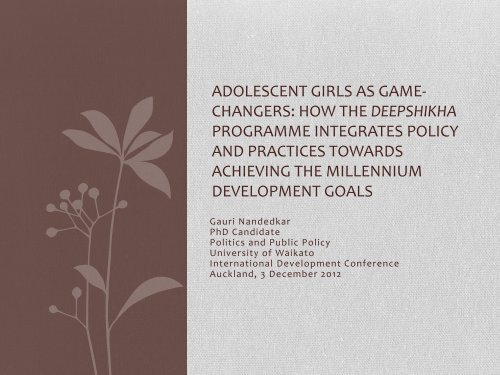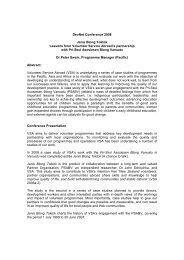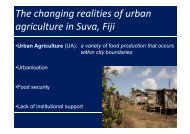Nandedkar, Gauri Adolescent Girls as Game-Changers ... - DevNet
Nandedkar, Gauri Adolescent Girls as Game-Changers ... - DevNet
Nandedkar, Gauri Adolescent Girls as Game-Changers ... - DevNet
You also want an ePaper? Increase the reach of your titles
YUMPU automatically turns print PDFs into web optimized ePapers that Google loves.
ADOLESCENT GIRLS AS GAME-<br />
CHANGERS: HOW THE DEEPSHIKHA<br />
PROGRAMME INTEGRATES POLICY<br />
AND PRACTICES TOWARDS<br />
ACHIEVING THE MILLENNIUM<br />
DEVELOPMENT GOALS<br />
<strong>Gauri</strong> <strong>Nandedkar</strong><br />
PhD Candidate<br />
Politics and Public Policy<br />
University of Waikato<br />
International Development Conference<br />
Auckland, 3 December 2012
Overview<br />
• Methodology<br />
• Theoretical framework – Why WCD?<br />
• Deepshikha Programme – Policy challenges, practical<br />
achievements<br />
• Final thoughts<br />
2
Methodology<br />
• Small-scale qualitative research project<br />
• Interviews, policy documents, observation of training<br />
• Research in support of the core thesis objectives:<br />
1) How do global discourses of development policy, embodied in the<br />
MDGs, translate into local contexts?<br />
2) How do culture, norms and values shape the interpretation and<br />
implementation of the MDGs with specific reference to gender<br />
empowerment?<br />
3
Theoretical framework – Why WCD ?<br />
• Beyond the WID, WAD and GAD paradigms<br />
• Women, Culture and Development (WCD)<br />
• ‘[…] because women are a foundation from which we can<br />
illuminate the circumstances of people’s lives, including men’s lives.<br />
To focus on women within development in this way offers<br />
prospects for seeing the lives of people <strong>as</strong> more tangled and<br />
therefore richer than h<strong>as</strong> hitherto been suggested. Thus, the WCD<br />
paradigm applies to both women and men.’ (Bhavnani and Bywater<br />
2009, p. 62)<br />
4
Field Research Site – India<br />
• Millennium Development Goal 3 – to promote gender equality<br />
and empower women<br />
• ‘Deepshikha’ - Unicef-funded and supported <strong>Adolescent</strong> <strong>Girls</strong><br />
Life-Skills programme<br />
• Chandrapur district Mahar<strong>as</strong>htra, India<br />
http://www.mapsofindia.com from left 'India', 'State of Mahar<strong>as</strong>htra', 'Chandrapur<br />
District with its 15 administrative blocks'<br />
5
The Deepshikha Programme<br />
• Transcending compartmentalised sectors of development work<br />
• Strengthening individual confidence and critical-thinking skills to<br />
foster concepts of collective action<br />
• Creating a dedicated space for adolescent girls to share<br />
experiences<br />
Photo:'Deepshikha - Prerik<strong>as</strong> in Training'; <strong>Gauri</strong> <strong>Nandedkar</strong>, Rajura/Chandrapur, April 2012<br />
6
<strong>Adolescent</strong> girls – transformative agents<br />
• Agents of development not just beneficiaries of programmes–<br />
shaping the community and engaging with leaders<br />
• Self-confidence to tackle issues within the family and community –<br />
challenging c<strong>as</strong>te and cl<strong>as</strong>s identities<br />
• Addressing the MDGs actively and critically<br />
Photo: '<strong>Adolescent</strong> <strong>Girls</strong> Group'; <strong>Gauri</strong> <strong>Nandedkar</strong>, Jiwati/Chandrapur, April 2012<br />
7
<strong>Adolescent</strong> girls – transformative agents<br />
• Strides made towards achieving MDGs 2, 4, 5, 6 and 7 (universal<br />
primary education, reduce child mortality, improve maternal health<br />
and combat HIV/AIDS and other dise<strong>as</strong>es, ensure environmental<br />
sustainability respectively)<br />
• Global – National – Regional – Local<br />
• Top-down or bottom-up – perhaps a continuous loop?<br />
8
Support for policy officials<br />
• Three impediments to policy implementation:<br />
1) Administrative Officer – 3-4 year rotation, penalty posting,<br />
‘making it through’ the socio-political environment<br />
2) NGOs and government ministries – focus on thematic sectors<br />
3) Lack of sufficient gender-sensitive training for government<br />
functionaries, block development officers and NGO-workers<br />
9
Final Thoughts<br />
• Continued support for life-skills/empowerment programmes for<br />
adolescent girls<br />
• Complementary modules for boys so both girls and boys become<br />
transformative agents of development<br />
• Better support and gender-sensitive training for policy officials,<br />
NGOs and others<br />
• Goal 3, now and post-2015, engages in gender empowerment and<br />
works towards including all adolescents in empowerment<br />
programmes for building stronger communities, strengthening ties<br />
across sectors and engaging in nation-building.<br />
10
ADOLESCENT GIRLS AS GAME-<br />
CHANGERS: HOW THE DEEPSHIKHA<br />
PROGRAMME INTEGRATES POLICY<br />
AND PRACTICES TOWARDS<br />
ACHIEVING THE MILLENNIUM<br />
DEVELOPMENT GOALS<br />
<strong>Gauri</strong> <strong>Nandedkar</strong><br />
PhD Candidate<br />
Politics and Public Policy<br />
University of Waikato<br />
International Development Conference<br />
Auckland, 3 December 2012






